Mar 5, 2025 – Day 17 of the 100-Day Dharma Talk, Weekly Dharma Assembly, Meeting with Religious and Civil Society Leaders
Hello. Venerable Pomnyun Sunim’s 100-Day Dharma Talk has already reached its 17th day. Today is the Weekly Dharma Assembly, where Jungto Society members ask Sunim questions about their practice and examine themselves.
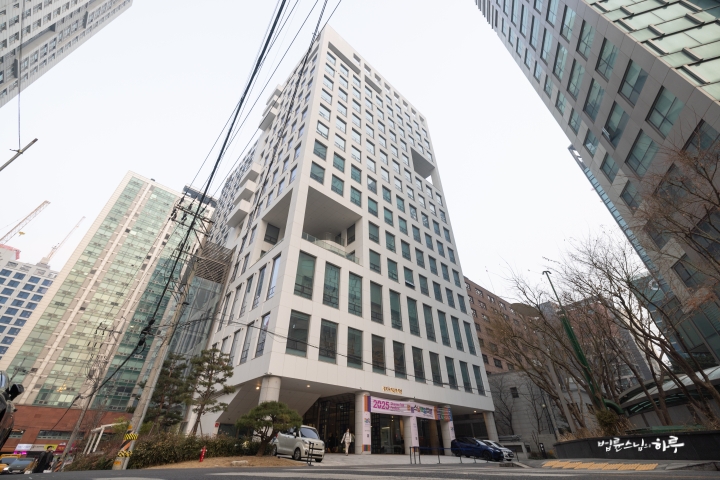
After completing his morning practice and meditation, Sunim headed to the Jungto Social and Cultural Center for the Weekly Dharma Assembly. Many volunteers had arrived early to prepare for welcoming the participants.
With about 140 people in attendance, the Weekly Dharma Assembly began at 10:15 AM with the recitation of the Three Refuges and the Heart Sutra. Jungto Society members from across the country also participated online. The assembly formally requested Sunim’s Dharma teaching with three full bows.
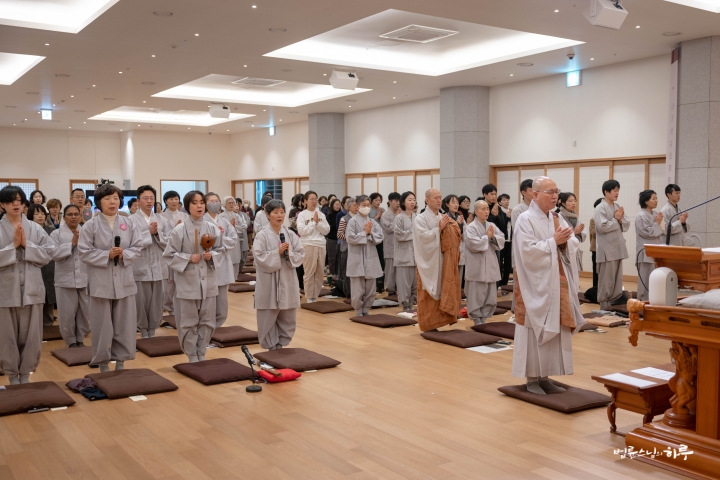
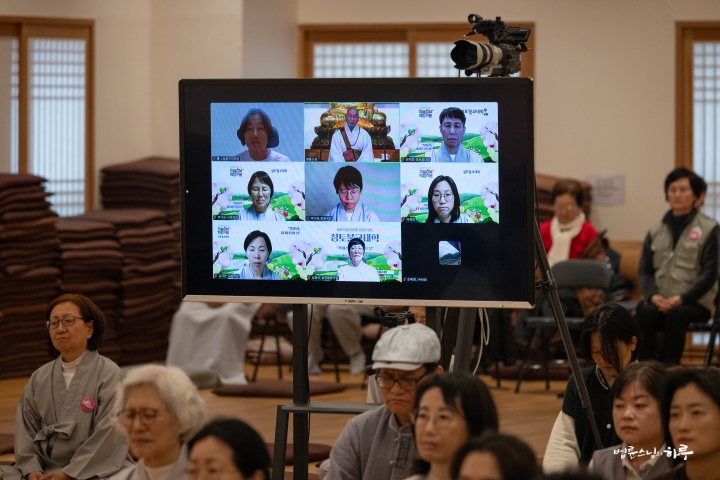
Sunim began by discussing the divided public opinion demonstrated at the pro and anti-impeachment rallies held in Gwanghwamun over the weekend. Sunim shared his thoughts on what perspective political leaders and citizens should adopt regarding the current political situation before opening the dialogue.
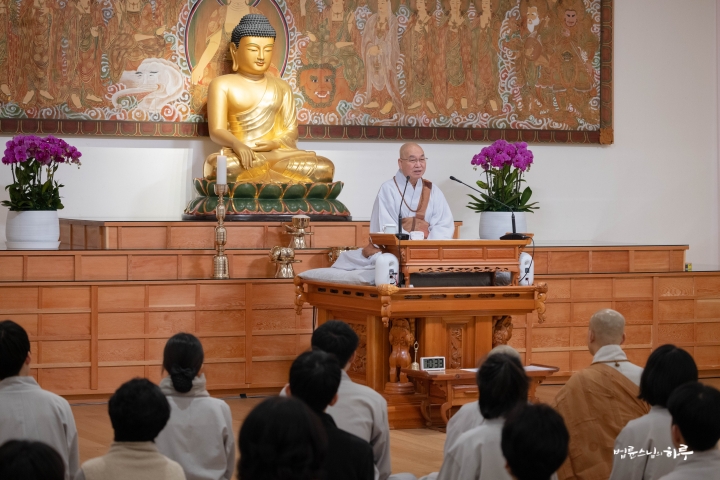
Today, one person asked a question online, and three asked questions in person. One participant sought Sunim’s advice on raising a 9-year-old child diagnosed with borderline intellectual disability, expressing concern about being overly sensitive to the child’s behaviors and wondering what perspective to adopt.
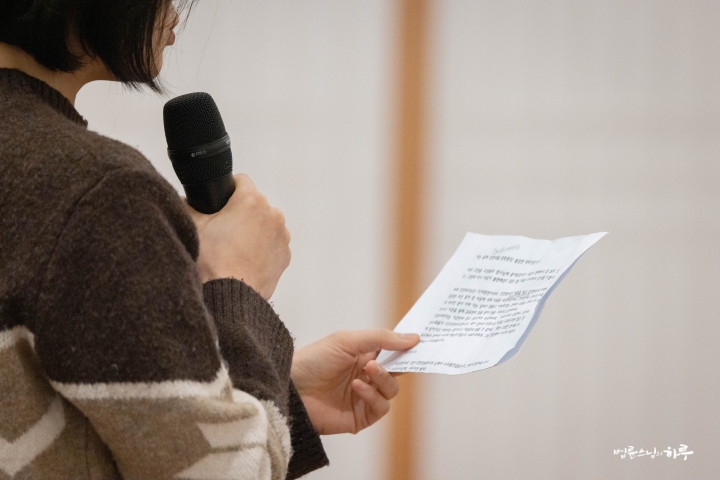
How Should I Raise a Child with Borderline Intellectual Disability?
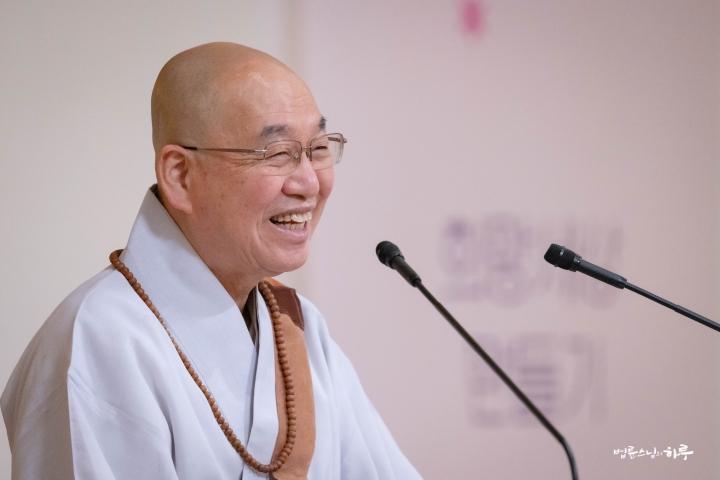
In the animal world, such as with monkeys or dogs, mothers don’t reject their offspring for not being smart enough, unlike humans sometimes do. A mother’s role is to raise her baby according to the baby’s situation, however they are born. If the baby can’t see, she raises them accordingly; if they can’t hear, she adapts to that reality. If they can’t walk, she accommodates that limitation, and if they have slightly lower intelligence, she adjusts her approach accordingly. People often raise dogs despite their lower intelligence compared to humans. So how do they raise dogs with lower intelligence? Even a person with intellectual challenges has far higher intelligence than a dog. Yet people say they can raise dogs well but can’t raise their own children. Moreover, we’re talking about your own child, not someone else’s. The reason for this difficulty is that your expectations are too high. You’re viewing your child from the perspective of a neighbor rather than as a parent caring for their child.
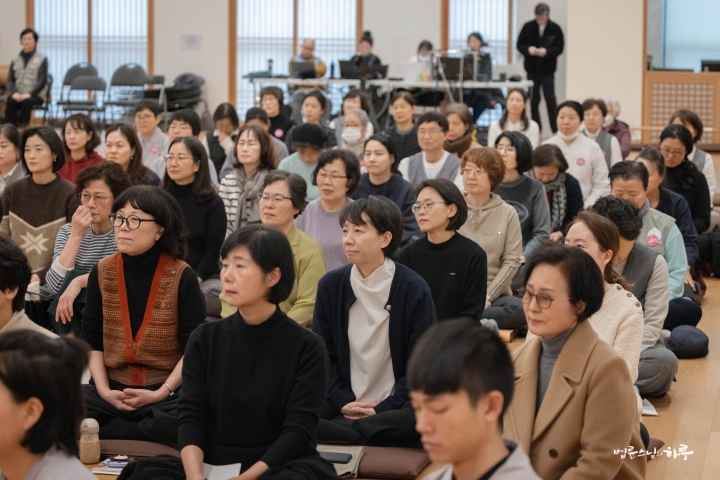
Parents fundamentally exist for their children. In the natural world, newborn babies cannot survive on their own. They need someone to care for them. Usually, parents provide this care, but if parents are absent, someone else must step in. Once children reach a certain level of maturity, they no longer need this care and must learn to live independently. However, until they reach that point, offspring must receive care to survive and maintain the species. This is why all parents instinctively care for their children—it’s called the instinct for species preservation. This instinct prioritizes the child’s life over the parent’s own life. This is true for all living beings.
The mother exists for the baby, not the other way around. Yet people often think children should exist for them. They believe they should see their children whenever they want, regardless of the child’s situation, even if it means taking the child away. This is a mistaken parental attitude. A parent’s role is to help alleviate any difficulties their child may be experiencing.
You become impatient because your expectations for your child are too high. When training a dog, people aren’t usually impatient. But with children, expectations are so high that parents become frustrated when a child can’t master in three attempts what might naturally take ten attempts to learn. Before understanding borderline intellectual disability, you might have scolded your child for poor academic performance, assuming they weren’t studying hard enough. But now that you’ve had testing done, you know your child’s intelligence is slightly below average. When intelligence is lower, what might take one explanation for others might require five explanations for your child. Children who cannot see must be taught using braille, and those who cannot hear must learn sign language. For children who have difficulty walking, we must assess whether they need a wheelchair or more walking practice. If walking practice is necessary, it should take priority over academic studies. If they cannot use their hands, they should be trained to use their feet instead. Education must be tailored to each child’s specific needs. Right now, you’re thinking like your neighbor rather than considering what’s best for your child.
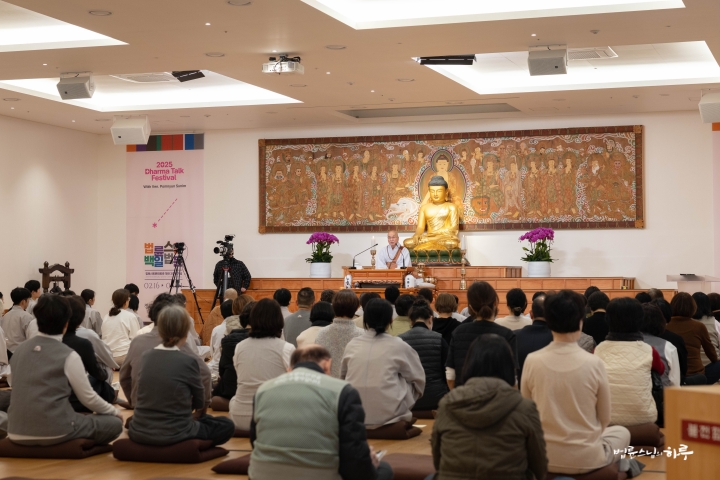
Without understanding a child’s condition, it’s impossible to provide appropriate education. If a diagnosis reveals memory or learning disabilities, you must allocate more practice time and repetitions based on the child’s specific needs. However, you’re becoming frustrated by comparing your child to others who understand concepts immediately. If that’s the case, you’re not qualified to be a mother. If you can’t fulfill your role as a mother, it would be better to entrust your child to professionals at facilities that understand and care for children with borderline intellectual disabilities.
If you scold or become impatient with your child when they don’t understand after multiple explanations, they will become psychologically intimidated. The child will also become anxious and develop an inferiority complex. When teaching something, if you approach it with the mindset that it might take ten practice sessions, you can praise the child when they succeed after only eight attempts. Even if your child says, “Mom, I’m sorry for making so many mistakes,” you should praise them for accomplishing in seven attempts what might have taken ten. This way, the child won’t develop an inferiority complex and will maintain pride in their existence.
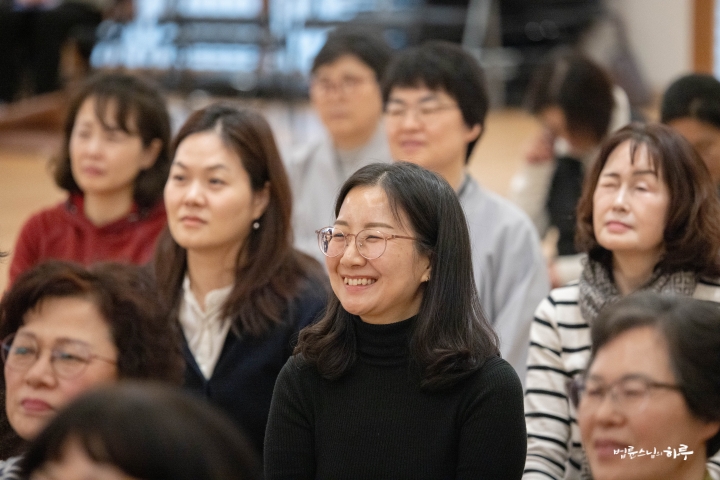
Instead of labeling a child with borderline intellectual disability, parents should be aware of the condition and respond appropriately to prevent the child from developing an inferiority complex. They need to give the child more time and opportunities to practice. If teachers don’t understand the child’s condition, they might simply scold them for poor performance. However, if teachers are informed about the child’s situation, they can offer praise instead of criticism. But if even mothers find this difficult, how can we expect teachers to manage? That’s why mothers need to take this approach first, even if teachers cannot.
Christians often view such circumstances as gifts from God. They think, ‘If this child had been born into another family, they might have faced many difficulties, but God sent them to us as a gift to be well cared for!’ They accept it with gratitude. You need this kind of attitude too. If this child had been born into another family, ignorant parents might have hastily pressured and scolded them. But as a practitioner, you should have the mindset to care for the child according to their abilities and condition.
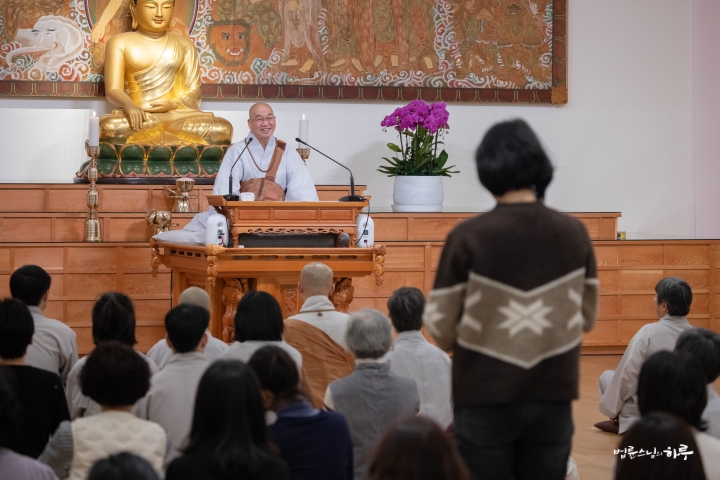
“Thank you. Is my obsession with intelligence tests also due to my greed?”
“You’re indulging in greed while wondering if it’s greed or not. Getting annual tests is good. However, you’re feeling frustrated because you’re testing to find signs of improvement. The purpose of regular check-ups is to prepare for potential deterioration. If the test shows nothing abnormal with your child, you should simply be grateful. If medication is prescribed, take it consistently. We conduct regular check-ups because the condition might gradually worsen.”
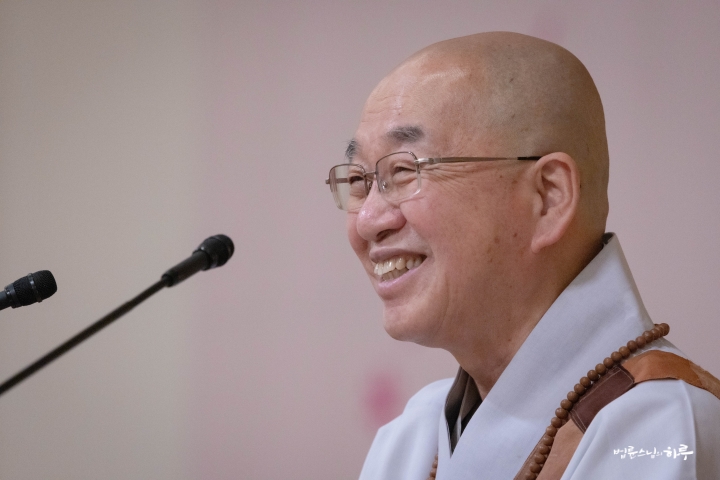
“My child follows along with other things well enough, but can’t make friends. When I asked a professional counselor, they suggested I should join mothers’ groups to create more opportunities for my child to interact with other children. But is it right to go to such lengths to create opportunities for my child to make friends?”
“Do you think that approach wouldn’t be helpful for your child?”
“No, that’s not what I meant.”
“Listening to you carefully, I sense some reluctance. Whether your child makes friends or not isn’t the core issue. It’s difficult for children to make friends at school anyway. Children become friends through shared activities—those who excel at sports become friends with other athletic children, those who excel at studies become friends with other academically strong children, and those who quickly master skills become friends with similarly skilled children. Children don’t typically befriend someone slower by accommodating them and walking together at a slower pace. Even adults find it difficult to befriend someone with disabilities by carrying them along, or to befriend someone struggling academically by teaching them. Even you, as a mother, are reluctant to make the effort. So expecting young children to do this is unrealistic. You’re asking others to do what you yourself won’t do. It’s not because children are bad, but at school, children mostly ostracize those with borderline intellectual disabilities. Children don’t understand. Because they don’t understand, when someone performs worse than them, they say, ‘Go away, how can you not know this!’
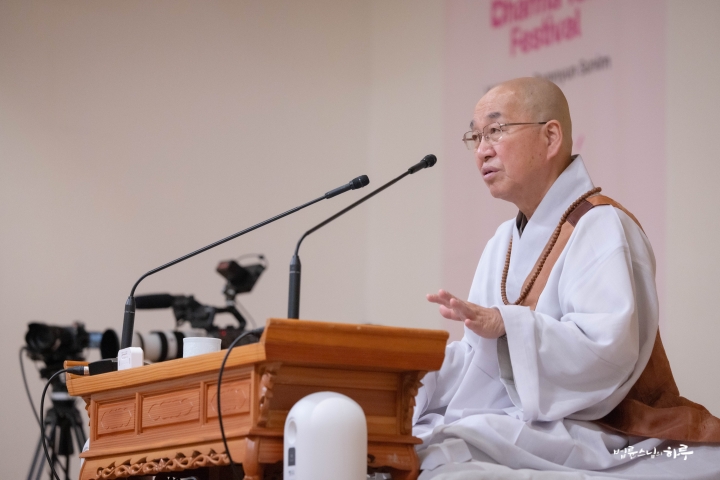
So in your child’s case, it’s difficult for them to make friends. Because it’s hard to make friends, they protect themselves by saying they don’t like friends. Saying they’re fine without friends is a way of self-protection. As they spend more time alone, they start to believe being alone is better. But if you meet ten friends, there’s occasionally one child who tends to care for those who are a bit more vulnerable than themselves. So if a mother creates many opportunities for her child to meet friends, they might find someone who can look after their child. It’s wrong to think that if you’ve tried ten times and haven’t made a single friend, you should give up. If ten attempts don’t work, try an eleventh time. If eleven attempts don’t work, try twenty times, looking for a child who might connect with your child and become their friend. That’s why I’m saying mothers should provide many opportunities. Of course, this means more work for you.
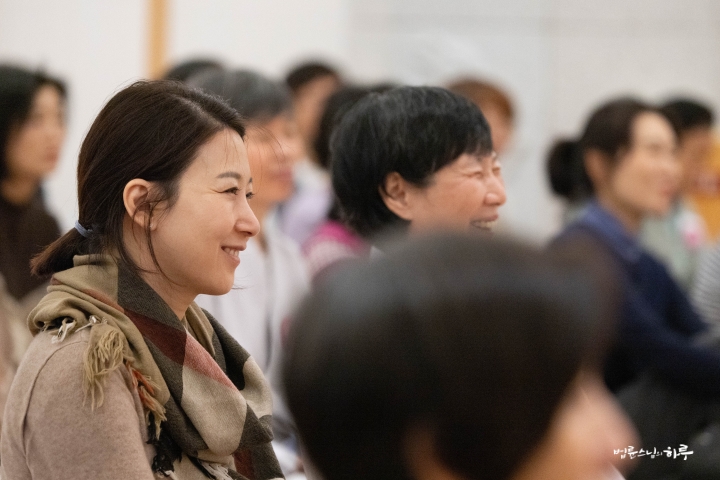
The core issue is that you have an underlying feeling of annoyance. You find it bothersome to wait for your child to practice until they achieve their goals, and you find the doctor’s instructions tedious as well. Deep down, you feel burdened because life is already difficult, and having a child with borderline intellectual disability means even more responsibilities. I hope you can let go of this mindset and embrace a loving attitude toward your child. Love isn’t just about affection; it’s about understanding the other person and providing what they need. Understanding is love.
The heart of your inner struggle is that you find caring for your child bothersome. Because this feeling underlies your thoughts, you keep wondering, ‘Is this really necessary?’ Instead of feeling annoyed, no matter how time-consuming or difficult it may be, you need to develop the mindset that you’ll do whatever helps your child. When you adopt this attitude, you’ll find more peace within yourself, and your child will feel more comfortable too.”
“Thank you.”
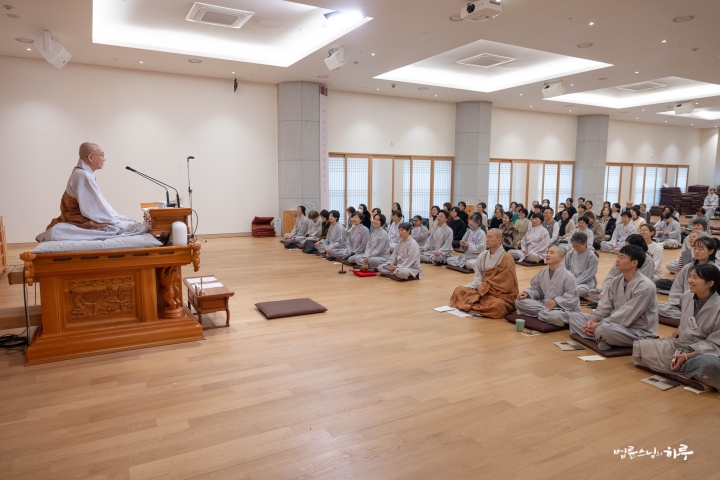
The questions continued.
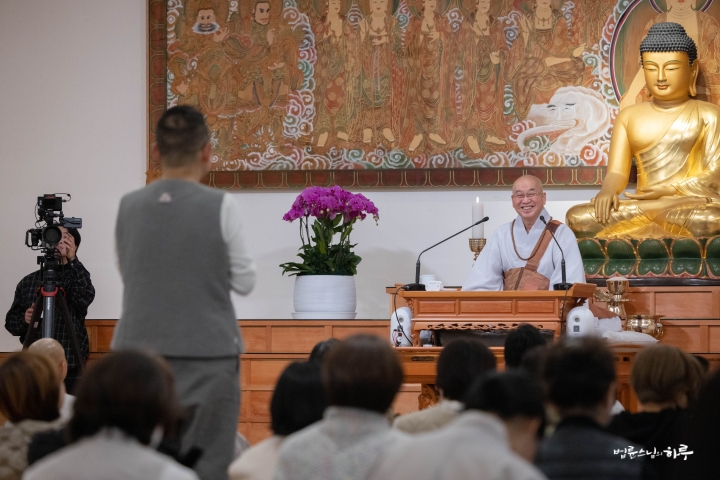
After finishing the conversation, it was almost noon. The members gathered in groups to share their thoughts, while Sunim moved to the dining hall on the first basement floor to have lunch together.
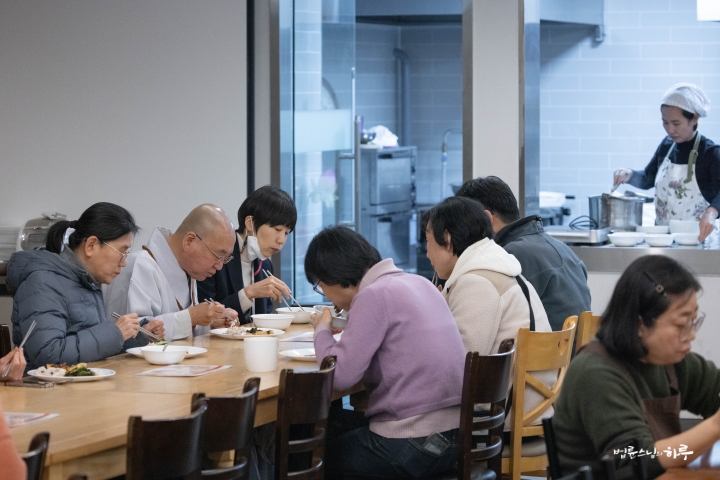
At 2 PM, senior figures from religious circles and civil society who were concerned about the growing national division following the martial law situation and impeachment crisis came to meet Sunim to discuss how to overcome these challenges.
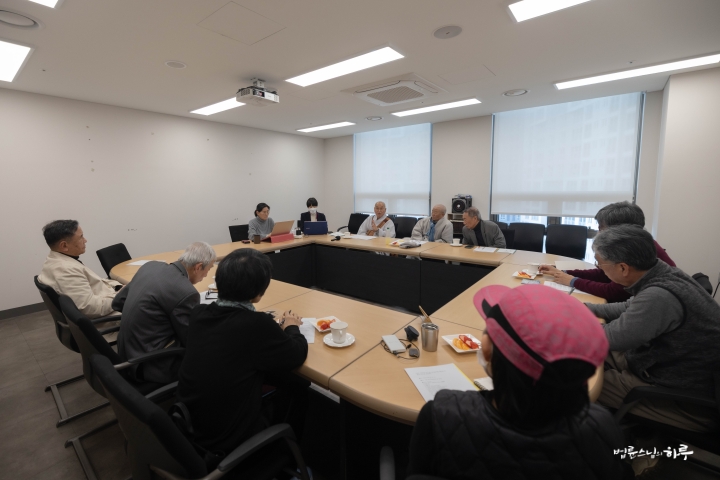
The visitors included Venerable Dobeop (Abbot of Silsangsa Temple), Mr. Lee Namgok (Humanities activist), Mr. Jung Sungheon (DMZ Peace and Life Garden), Mr. Kang Dae-in (Director of Dialogue Culture Academy), Ms. Cho Hyun-ju (Standing Representative of the 1,000 People Declaration for a Symbiotic Society), Mr. Lee Moo-yeol (Chairman of the Jirisan Conference Steering Committee), Mr. Jung Woong-ki (Chairman of the Indramang Life Community Steering Committee), and Ms. Lim Eun-young (Secretary, Indramang Secretariat). They all gathered at the Peace Foundation to engage in dialogue with Sunim.
How Can We Achieve National Unity Amid Endless Division?
First, Mr. Lee Namgok explained the purpose of today’s meeting and the proposal.
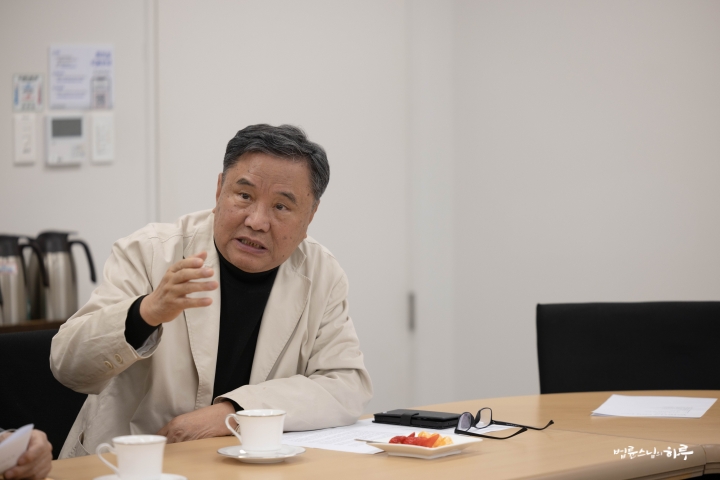
“Objectively speaking, South Korea isn’t in a situation where civil war should occur, yet the national division is deepening to the point where we’re almost in a civil war-like state. To overcome this situation, we ultimately need to achieve constitutional reform through dialogue and compromise, opening the way for the Seventh Republic. The need for constitutional reform is emerging everywhere like a bursting dam. However, there are subtle conflicts between active and passive constitutional reformists, and complex disagreements about coalition politics—whether to form a small coalition or a grand coalition. In fact, what’s more fundamentally needed than changing the power structure is reforming our political culture. This is a major reason why we’ve come to see Venerable Pomnyun Sunim.”
Next, Mr. Kang Dae-in shared his thoughts.
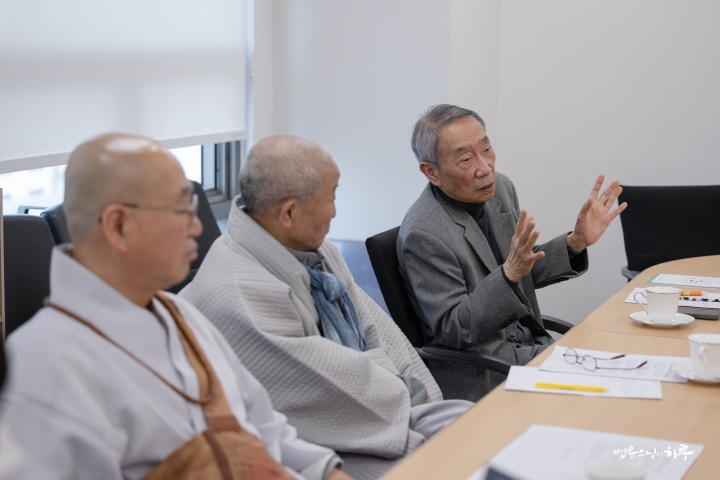
“Former National Assembly Speakers, Prime Ministers, and many social elders unanimously say that now is the perfect time for constitutional reform. Although every presidential candidate has talked about constitutional reform, none has actually implemented it after taking office. That’s why timing is crucial for constitutional reform. Most social elders agree that we need to establish safeguards to ensure constitutional reform happens before the presidential election. While people are only worried about the Constitutional Court’s impeachment ruling, I’m more concerned about what happens after the presidential election. I think the continuing cycle of revenge is even more dangerous. To resolve this situation, rather than issuing statements, I believe it would be better if someone like Venerable Pomnyun Sunim created a network with moral authority that could serve as a pillar for citizens to rely on. I’d like to discuss this candidly.”
Mr. Jung Sungheon also shared his opinion.
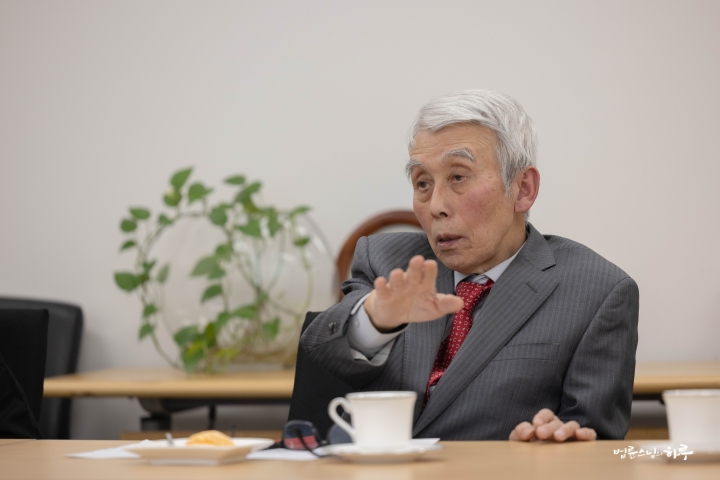
“Regarding constitutional reform, most people agree, and the content is already prepared. The most important question is who will be the messenger. I believe people like Venerable Pomnyun Sunim should take the lead for this process to move forward smoothly.”
Ms. Cho Hyun-ju also expressed her thoughts.
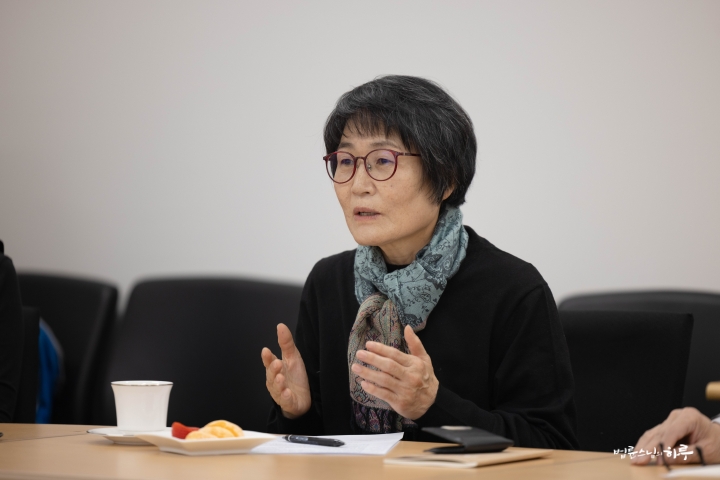
“While I think long-term discussion forums are important, I also believe we need temporary events to cool down the escalating tensions in this dangerous situation. For example, we could organize a roundtable discussion at Gwanghwamun Square where Venerable Pomnyun Sunim serves as the moderator, bringing together the National Assembly Speaker and senior lawmakers from ruling and opposition parties to share a meal of bibimbap.”
Venerable Dobeop also shared his perspective.
“Listening to this discussion, I’m thinking: let’s stop the fighting and facilitate negotiation. I hope we can establish this as a cultural norm in our society. If the parties involved cannot reach an agreement through direct dialogue, we need elders who can stop the fighting and facilitate negotiation.”
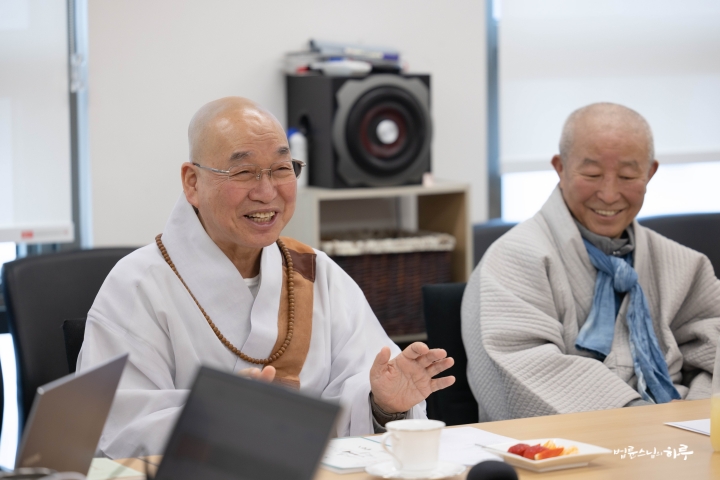
All participants emphasized the need for a long-term perspective to end the vicious cycle of political revenge, and spoke with urgency about the importance of national unity.
Sunim also shared his thoughts on the proposals.
“I agree with your perspectives on the current situation. Even after the Constitutional Court’s ruling, regardless of who wins the election, resolving the national division will remain difficult.
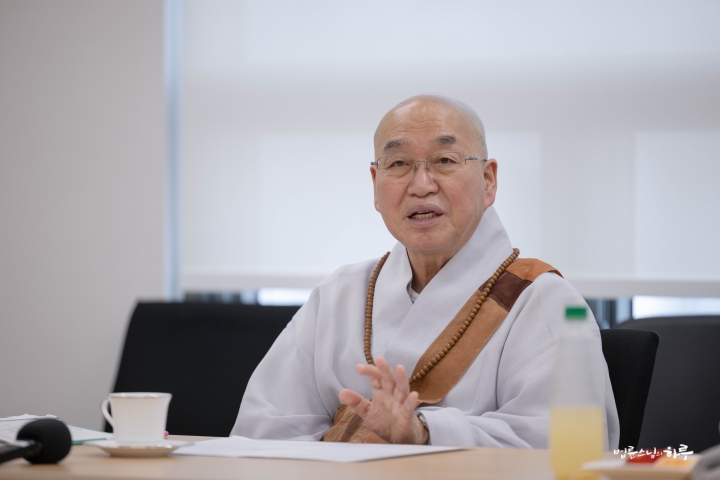
In the past, people would debate but ultimately accept court rulings and election results. Now, however, people refuse to accept either court decisions or election outcomes. It’s not about what result emerges, but rather that we’re in conditions where conflict is bound to continue. I believe this isn’t just a problem in our country but a global phenomenon, though perhaps more severe in Korea.
The Path We Must Take Despite Seemingly Impossible Resolution
During the North-South division period, North Korea’s ruling powers seized control with Soviet backing, while South Korea’s ruling powers did so with American support. There were people who advocated for national unity and reunification, but their efforts ultimately failed. Perhaps we’re in a similar situation now. Attempts to unify public opinion between polarized forces are more likely to fail than succeed. However, no matter how slim the chances, if it’s the right path, I believe we must pursue it to the end with our best efforts.
The current climate crisis also seems unlikely to be resolved. Humans will probably only change course when we reach a dead end. Perhaps pursuing social justice is less about succeeding and more about doing our utmost to prevent impending dangers. From this perspective, I think we should consider what’s realistically possible for us to achieve.
Sunim then discussed specific, practical methods for achieving constitutional reform and national unity in the current conflict.
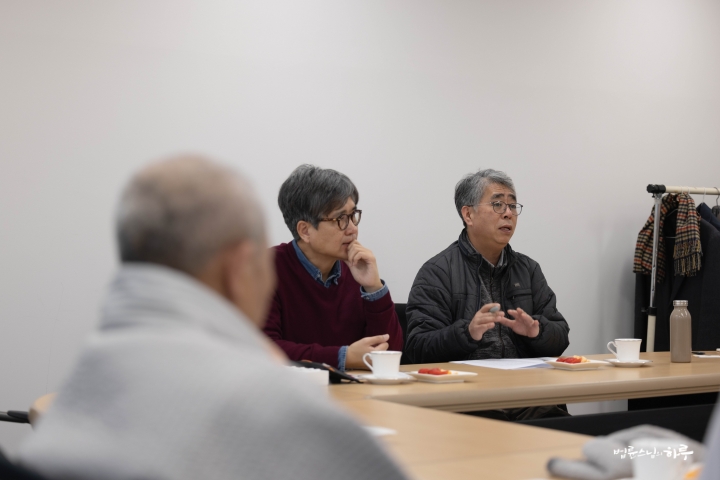
Everyone agreed with Sunim’s opinions and continued the discussion, which lasted for three hours. Sunim emphasized that this is a time when we need the wisdom to turn crisis into opportunity.
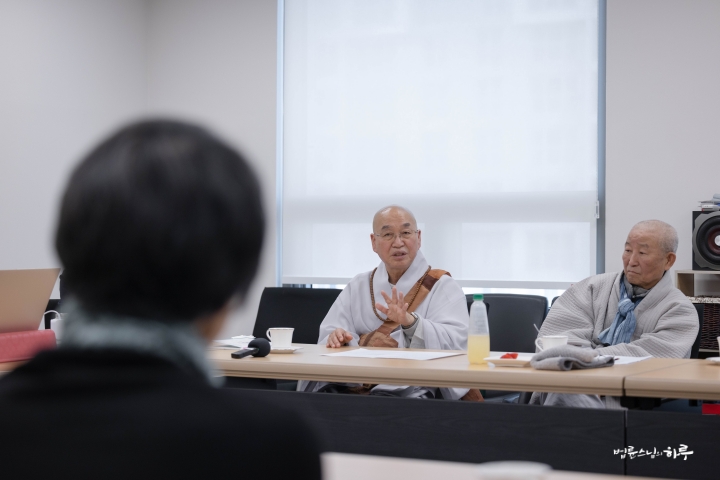
“Looking at history, our ancestors at the difficult end of the Joseon Dynasty advocated for a new world order where ordinary people would become the masters of the nation. Didn’t the royal family and nobility suppress them as traitors, accusing them of deceiving the people? When they couldn’t suppress the movement with their own power, they brought in foreign forces. As a result, our country was lost to those foreign powers.
A Time When We Need Wisdom to Turn Crisis Into Opportunity
While losing our country was a tragic event, it had some positive aspects. With the fall of the nation, the privileges of the royal family and nobility disappeared. Had the country not fallen, attempts to create a new nation with the people as its masters might have led to civil war due to interference from the royal forces. However, when it came time to reclaim the country, the rulers responsible for its loss did not step forward. Ultimately, it was the people who rose up to save the nation through the March 1st Movement. When the time came to establish a new country with the people as its masters—the Republic of Korea—there was no significant opposition. In retrospect, ironically, losing our country to foreign powers played a positive role in making today’s Republic of Korea a nation where citizens are the masters. The feudal legacy of 500 years was largely cleared away during Japanese colonial rule and the Korean War. Because these events overturned the old roots, today’s equal democratic society became possible. This isn’t to say that colonial rule or war was good. I’m pointing out that, paradoxically, crises can sometimes have positive effects.
Japan, which didn’t go through this process, maintained social order without major disruption, but feudal elements still remain embedded throughout their society. They never overturned those roots. From this perspective, we shouldn’t view our current difficulties as entirely hopeless. While President Trump’s election has created economic challenges for Korea, there are positive aspects as well. The 80-year-old North-South conflict, which couldn’t be resolved under the existing world order, might actually be solved during the Trump presidency because President Trump is dismantling the existing order. That’s why we need a positive attitude that sees this time of dismantling the existing order as an opportunity.
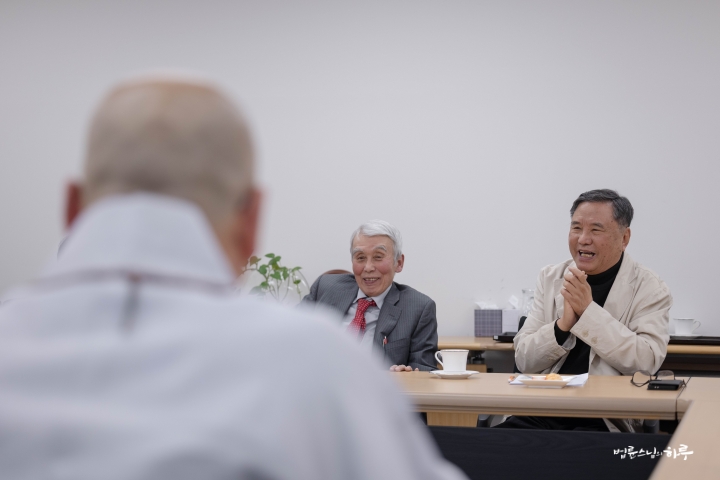
The issue is how to make the most of this opportunity. We have consistently grown through exports under the free trade system, but as the existing order collapses, we may have to accept some losses. However, I believe that accepting some economic losses is relatively better than suffering losses from war. If economic losses are inevitable, we should work to minimize them while addressing the unresolved issue of war anxiety. By doing so, we can turn this crisis into an opportunity to leap forward as a new nation.
Having the Insight to Turn Waste into Fertilizer
The problem is that our country’s political leaders lack the insight or ability to turn waste into fertilizer. That’s why they’re so fixated on immediate power. Our challenge is how to overcome this reality.
The polarization intensified by YouTube algorithms isn’t just a problem in our country. It’s a global trend. The emergence of far-right forces is also a worldwide phenomenon. The shift of men in their 20s toward conservative views is another factor making problem-solving difficult. Some younger people seem to be connecting with existing social grievances, deepening conflicts. These issues are positioned throughout our society.
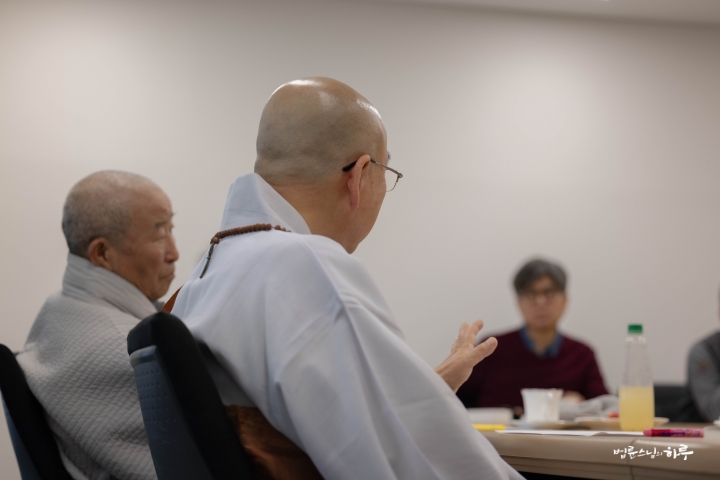
At times like these, political leaders should be working to ease conflicts, but instead, they’re fueling these conflicts for their own political gain. If you who are well-informed about current issues would work with the elders to propose solutions, I will serve as a messenger. I hope this gathering will expand and continue to make significant contributions to creating a sustainable vision for our nation’s future.”
The meeting concluded with agreements to take immediate action for national unity if needed in the short term, and to continue discussions for building a new Republic of Korea in the long term.
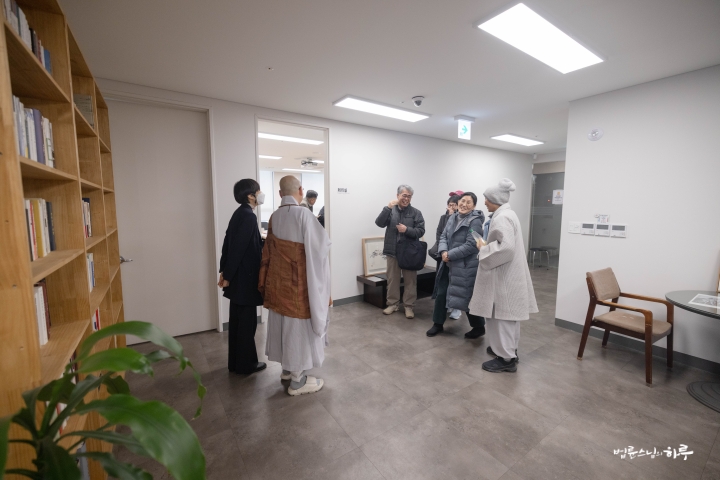
As the sun set, the evening Weekly Dharma Assembly for evening session members began at 7:30 PM. About 70 people gathered in the third-floor Dharma hall, while Jungto Society members from across the country participated online. Everyone requested Sunim’s Dharma talk with three bows.
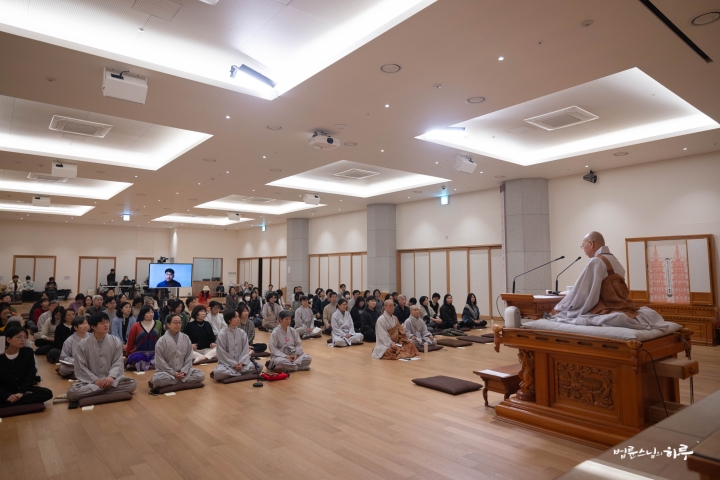
Two people connected online to ask Sunim questions, and two more raised their hands to ask questions in person. One of them sought Sunim’s advice about feeling unsettled because a fortune teller had predicted that her daughter would fail her university entrance exam and that her marriage would deteriorate, asking what perspective she should maintain.
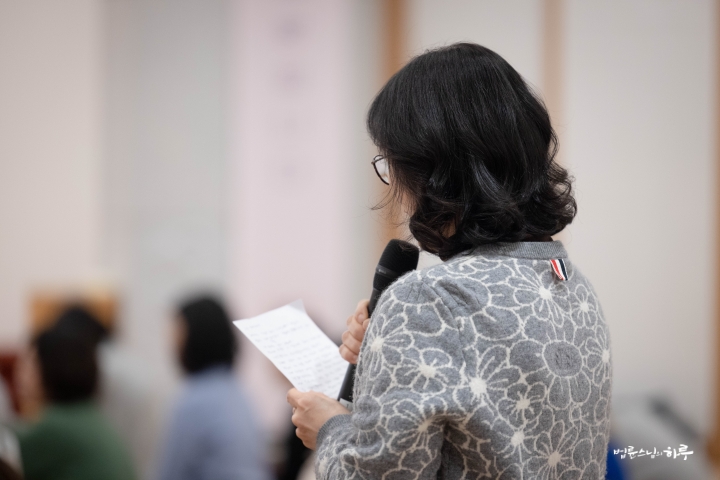
How Can I Avoid Being Swayed by a Fortune Teller’s Words?
“If you’re anxious after hearing the fortune teller’s words, just give them some money. What’s so difficult about that? The problem is that you’re reluctant to spend the money, yet you’re anxious about ignoring the prediction. This is what we call greed.
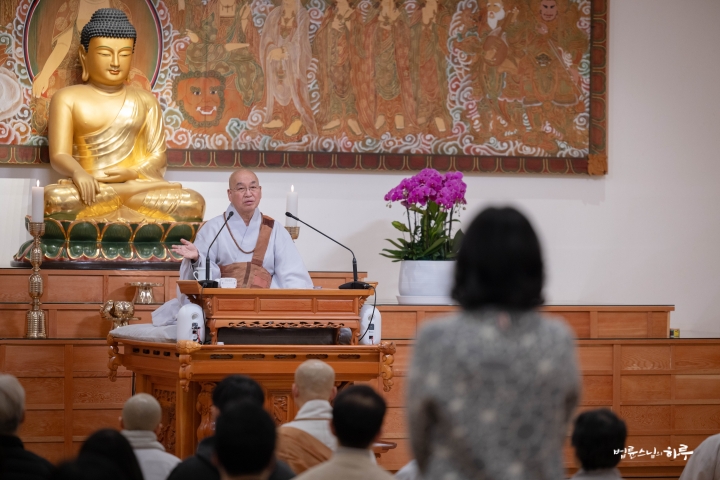
The fortune teller says appeasing your ancestors will help your daughter, so whether it’s true or not, just make some offerings. But objectively speaking, there are two reasons why your daughter might fail her college entrance exam: either she didn’t study well enough, or she was too ambitious and applied to universities beyond her abilities. If she applies to universities that are one or two levels below her test scores, her chances of rejection are lower. Conversely, no matter how good her scores are, if she applies to universities above her level, her chances of rejection are higher.
I can’t say whether to believe the fortune teller or not. The core issue is your psychological anxiety. Fortune tellers professionally read the anxious psychology of people who come for readings. Most people visit fortune tellers because they’re anxious. From the fortune teller’s perspective, there’s no accountability if they predict failure and the student succeeds. If they predict failure and the student actually fails, then their prediction was correct. However, if they predict success and the student fails, people complain. That’s why they tend to predict failure.
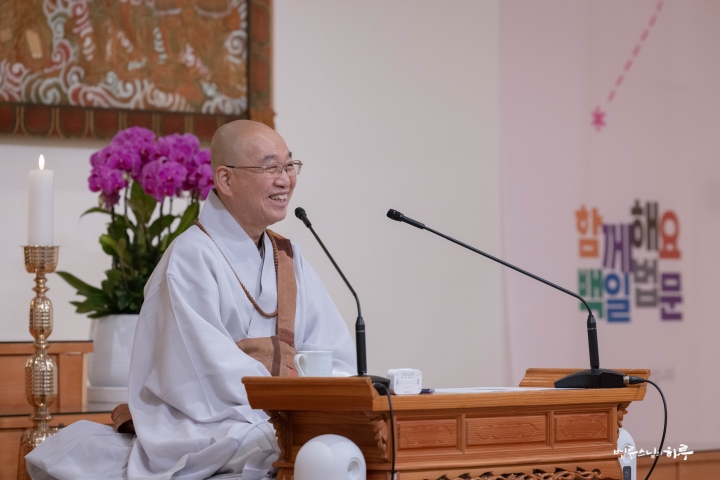
If you feel anxious about doing nothing, you can give money. Another approach is to recognize, “I’m feeling anxious because of my greed,” and let that awareness dissolve your anxiety. It’s up to you to choose which method works best.
Conflicts between spouses don’t arise because ancestors are angry; they happen because both people stubbornly cling to their own perspectives. If you don’t want to waste money on fortune tellers, try accommodating your husband more. If that’s not possible, then go ahead and pay the fortune teller. What other options are there? Ultimately, this is your issue—not the fortune teller’s problem, not your mother’s problem, but your problem.
When couples come to me asking, “Sunim, what was our relationship in our past life?” I answer, “You were enemies in your past life.” They then ask, “How do you know that so well?” It’s not that I have special powers. Would couples who get along well come to me asking about their past lives? They come to me precisely because they’re not getting along.
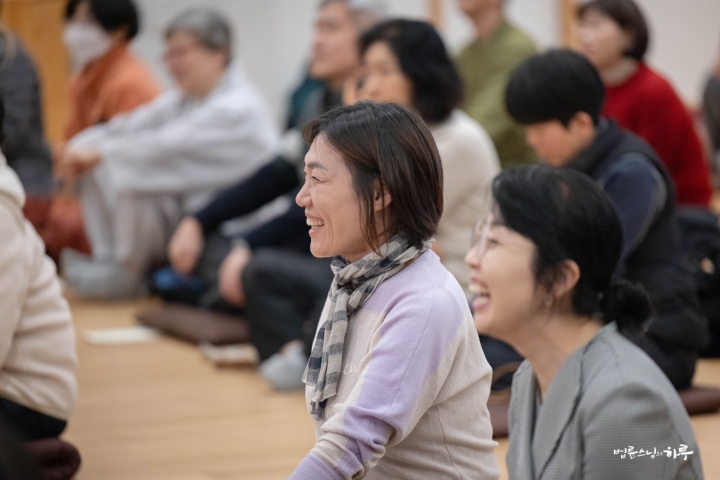
The same applies when we hold memorial services. From a practice perspective, since practice is about realizing the principle of having no fear of death, there’s no need to hold memorial services. However, in reality, we often feel regret and fear. In such cases, holding a memorial service can be comforting. Similarly, debating whether a fortune teller’s words are true or not is meaningless. Fortune telling is a matter of belief. It’s about whether you believe it or not, so it’s your choice whether to pay for comfort. If you pay money but still fail to get into college or end up divorcing, you’ll realize that paying was pointless. And if you paid a little money and found comfort, then the money wasn’t wasted.
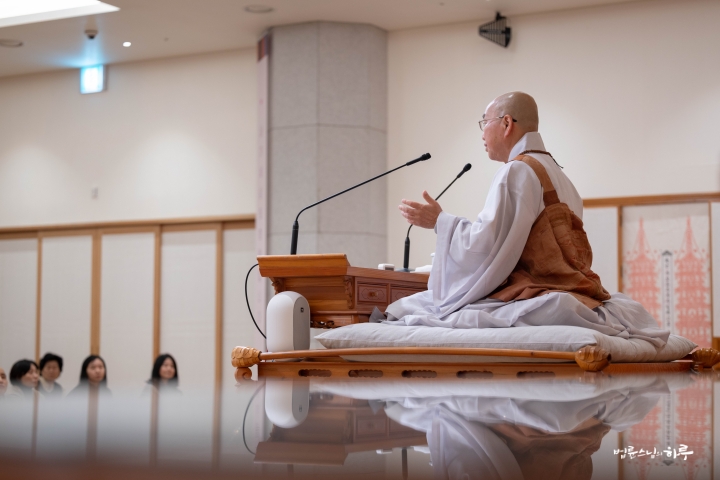
If you’ve decided not to pay the fortune teller, then when your daughter fails to get into college, don’t regret not paying and just accept the consequences that have occurred. She failed because she was going to fail anyway, not because the fortune teller said she would. You should accept the consequences of your actions, but because you keep trying to avoid them, you keep getting swayed by the fortune teller’s words. This is your issue and has nothing to do with the fortune teller.”
“Thank you. I understand now.”
The questions continued.
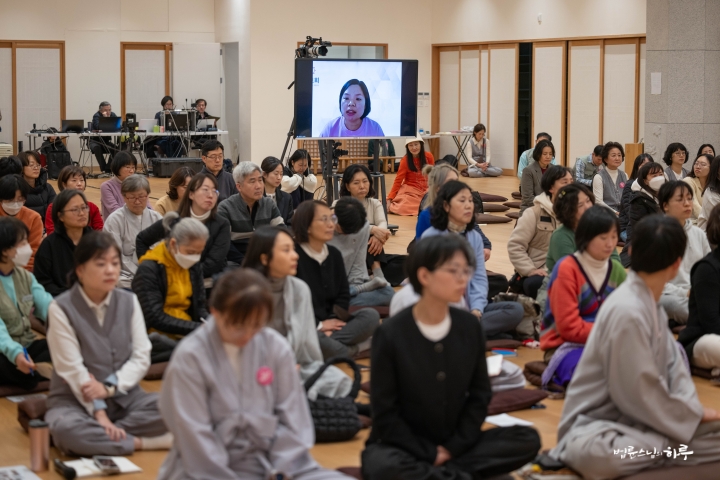
Regarding President Yoon Suk-yeol’s charges of insurrection, is it better to give a moderate punishment and move on, or to properly punish him as a lesson? What is the wise path for national unity?
During meditation, why can’t I observe or be aware when I’m focused on my breathing?
As Sunim continued answering questions, it was already past 9 PM. The live broadcast concluded with a promise to meet again at next week’s Dharma Assembly.
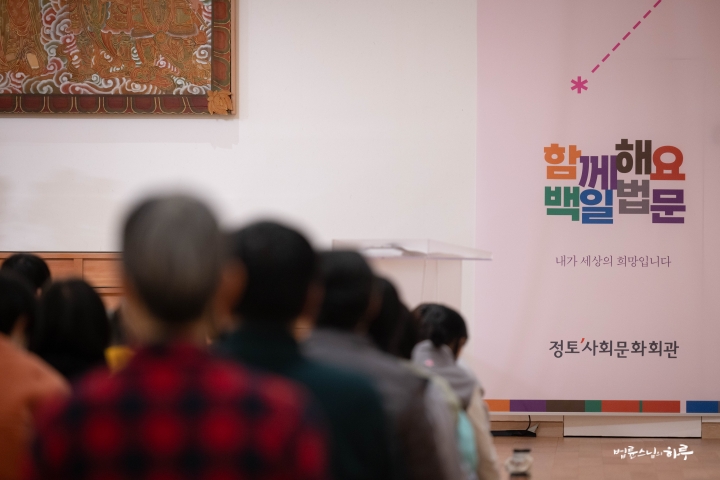
The participants sat in circles by group to share their thoughts, while Sunim left the Dharma hall and headed to the Jungto Center.
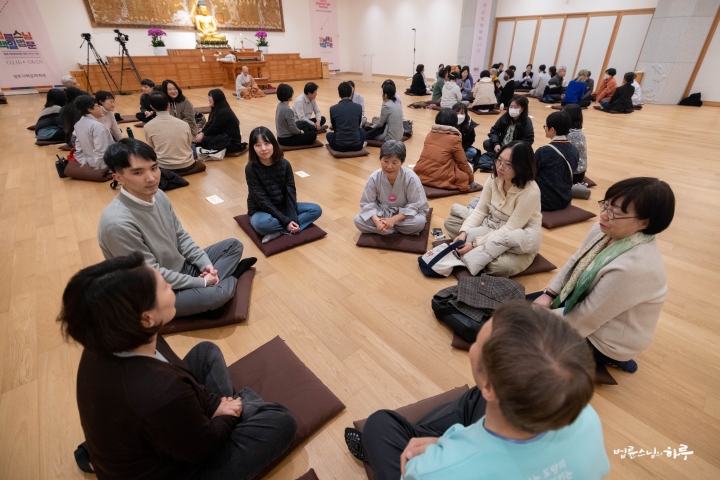
Tomorrow will be the 18th day of the 100-Day Dharma Talk. In the morning, Sunim will give the final lecture of the Open Dharma Assembly on the topic of “Memorial Services.” In the afternoon, he will meet with Korean Peninsula experts, and in the evening, he will deliver the final lecture of the Open Dharma Assembly on “The Song of Dharma Nature.”




